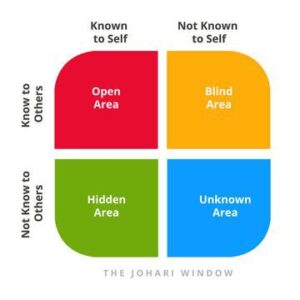-
- Hidden area
It is natural for very personal and private information and feelings to remain hidden. The aim should be to disclose and expose relevant information and feelings through a process of self-disclosure. This enables better understanding, cooperation, trust, team-working effectiveness and productivity. By reducing the hidden areas of our lives either at school, at home and in the wider community, we reduce the potential for confusion, misunderstanding, poor communication, etc. and increase productivity. You may consider disclosing important and value adding areas about yourself to your child and allowing them to also share vulnerably to you about some of their hidden areas.
-
- Unknown area
This area includes, feelings, behaviours, attitudes, capabilities, aptitudes, which can be quite close to the surface, or a deeper aspects of a person’s personality, influencing their behaviour to various degrees. Some of these areas in our lives include: An ability that is under-estimated, a talent that is not discovered, an interest that is not explored, repressed feelings or unconscious motivations. You may want to use this holiday season to discover unknown areas about yourself and your child. You will be amazed at the great treasure that you and your child carry and areas that need your growth attention.

The Johari window is a visual representation of what you know about yourself, and what others know about you, to help develop self-awareness and trust. It is a useful tool in understanding your relationship with yourself and others. Johari Window model can be a useful tool if you want to improve your communication skills. It has four areas which are:
-
- Open area
This blind area is not an effective or productive space for individuals or groups. This blind area could also be referred to as ignorance about oneself, or issues about which one is deluded. A hidden area could also include issues that others are deliberately withholding from a person. Group members can take some responsibility for helping an individual to reduce their blind area. Taking time to affirm your child is a wonderful way of helping them discover their blind areas of strength.
This area or pane is called open area because the information in this pane about the behavior, feelings, emotions knowledge, experience, skills and views about the person is known to that person as well as the other members in this group. The aim in any group for instance at home, at school or at work should always be to develop the ‘open area’ for every person because we are most productive and effective when we work in this area with others, and the group is at its most productive too. During the holiday/ school break, you could create some more time to bond with your child and increase the open area between you.
This blind area is not an effective or productive space for individuals or groups. This blind area could also be referred to as ignorance about oneself, or issues about which one is deluded. A hidden area could also include issues that others are deliberately withholding from a person. Group members can take some responsibility for helping an individual to reduce their blind area. Taking time to affirm your child is a wonderful way of helping them discover their blind areas of strength.
-
- Hidden area
It is natural for very personal and private information and feelings to remain hidden. The aim should be to disclose and expose relevant information and feelings through a process of self-disclosure. This enables better understanding, cooperation, trust, team-working effectiveness and productivity. By reducing the hidden areas of our lives either at school, at home and in the wider community, we reduce the potential for confusion, misunderstanding, poor communication, etc. and increase productivity. You may consider disclosing important and value adding areas about yourself to your child and allowing them to also share vulnerably to you about some of their hidden areas.
-
- Unknown area
This area includes, feelings, behaviours, attitudes, capabilities, aptitudes, which can be quite close to the surface, or a deeper aspects of a person’s personality, influencing their behaviour to various degrees. Some of these areas in our lives include: An ability that is under-estimated, a talent that is not discovered, an interest that is not explored, repressed feelings or unconscious motivations. You may want to use this holiday season to discover unknown areas about yourself and your child. You will be amazed at the great treasure that you and your child carry and areas that need your growth attention.


